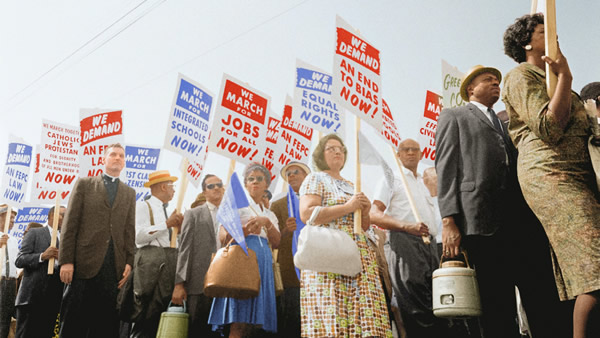Definition
The right to collective bargaining is a fundamental labour right and includes freedom of association. Together they form the main conditions for a working system social dialogue. The right to collective bargaining ensures a fair process of negotiation to further and protect the interests of workers and employers. Freedom of association ensures the right of workers to form and join organisations of their own choosing, such as a trade union.
Legislation
In 1948 the International Labour Organisation (ILO) adopted Convention No. 87 concerning the Freedom of Association and the Protection of the Right to Organise. As of march 2022 this convention has been ratified by 155 countries. Article 2 of this Convention states that “Workers and employers shall have the right to establish and join organisations of their own choosing without previous authorisation”.
One year later the ILO adopted Convention No. 98 concerning the Right to Organise and to Bargain Collectively. As of march 2022, the convention has been ratified by 166 countries. Article 4 of this Convention establishes that states have to take the necessary measures to encourage and promote the full development and utilisation of systems for voluntary negotiations between workers’ organisations and employer’s organisations.
The Committe on Freedom of Association (CFA) is part of the supervisory mechanism of the ILO. This standing ILO committe decides on complaints of workers’ organisations and employer’s organisations concerning Conventions 87 and 98.
Fundamental Principles and Rights at Work
The ILO Declaration on Fundamental Principles and Rights at Work recognises the right to collective bargaining and freedom of association as fundamental labour rights. This means all member states must respect and promote these rights, whether or not they have ratified the relevant Conventions1. Additionally, freedom of association and the right to collective bargaining are mentioned in the third principle of the Labour Standards of the United Nations Global Compact and are referred to in the United Nations Guiding Principles on Business and Human Rights. Finally, the OECD Guidelines for Multinational Enterprises declare in article 1 that enterprises should respect the right of their employees to establish and join trade unions and representative organisations of their own choosing. Consequently, enterprises should engage in constructive negotiations, either individually or through employers' associations, with such representatives with a view to reaching agreements on terms and conditions of employment. In article 2, the OECD Guidelines also state that the enterprise should provide the facilities to worker's representatives as to assist in the development of effective collective agreements, and provide the information necessary for meaningful negotiations on the conditions of employment.
Human Rights
Freedom of association and the right to collective bargaining are also considered human rights. Therefore they are protected by several core international human rights treaties. In the Universal Declaration of Human Rights freedom of association is mentioned in article 20 (the right of peaceful assembly and association). In paragraph 4 of article 23 the right to form and to join trade unions is declared.
Additionally, the right to form and join trade unions is acknowledged in both the International Covenant on Civil and Political Rights (ICCPR) and the International Covenant on Economic, Social and Cultural Rights (ICESC). Paragraph 1 of article 22 of the ICCPR states that “Everyone shall have the right to freedom of association with others, including the right to form and join trade unions for the protection of his interests”. States can only restrict this right under specific circumstances that are ‘necessary in a democratic society’. Paragraph 1 of article 8 of the ICESC protects “The right of everyone to form trade unions and join the trade union of his choice for the promotion and protection of his economic and social interests”. This part of the article proclaims the right to collective bargaining.
Regional context
In a regional context, the European Convention on Human Rights states in article 11 that everyone has the right to freedom of association, including the right to form and join trade unions for the protection of his or her interests. Paragraph 2 of the same article places strict conditions on the restrictions to this right. The European Social Charter declares the freedom of association in article 5. Article 6 of the same Charter states that all workers and employers have the right to bargain collectively.
The Inter-American Convention on Human Rights establishes the freedom of association, inter alia for labour purposes, and states under which conditions restrictions may be applied. The African Charter on Human and People's Rights mentions the freedom of association in article 10, however makes this right conditional on adhesion to the law.
1 https://www.ilo.org/declaration/lang--en/index.htm






